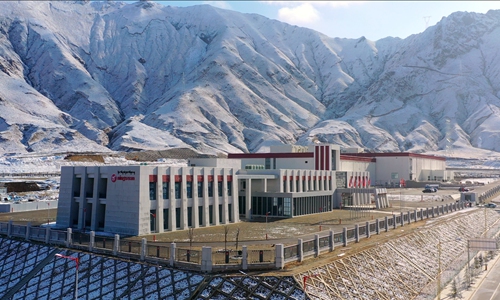US containment of China’s technology rise spreads to cloud computing, move to bite itself in the end: analysts

A view of the cloud computing data center in the Liuwu New Area in Lhasa, capital of Southwest China's Tibet Autonomous Region Photo: Courtesy of Ningsuan Technologies
Following the threat of a ban on short-video platform TikTok, some US politicians are stirring up hype on China's technology rise by urging the Biden administration to impose sanctions on Chinese cloud computing firms, as they keep politicizing normal business by citing the "national security" excuse.
Chinese analysts said the sanctions will be difficult to operate, given the limited control of the US government in the cloud computing sector and the potential damage to its own businesses.
The remarks came after nine Republican senators on Tuesday urged the Biden administration to impose sanctions on Huawei Cloud and other Chinese cloud service providers, according to a Reuters report, which cited an unreported letter.
The letter, led by Senator Bill Hagerty to the Commerce, State and Treasury departments said that Chinese cloud computing companies "are increasingly engaging with foreign entities - in some cases sanctioned foreign entities - that are directly challenging the national security and economic security interests of the United States and our allies and partners."
The letter also asked the Biden administration to add Alibaba Cloud to the Commerce Department's export control list, arguing its close ties to the Chinese military "render it a clear ongoing national security threat" and that the Treasury should add Alibaba Cloud to a list of companies involved in the Chinese military-industrial complex.
The Biden administration has previously reviewed the cloud business of Alibaba to determine whether it poses a risk to US national security, Reuters reported in January last year.
The letter said that the US government should consider further investigations of China's other cloud service providers, including Baidu Cloud and Tencent Cloud.
In response, Mao Ning, the spokesperson for China's Foreign Ministry, told a press conference on Wednesday that "We have always opposed generalizing the concept of national security and unreasonably suppressing Chinese companies."
The act of intentionally interfering with normal economic and trade exchanges between the two countries is unpopular and will eventually harm the interests of American consumers, Mao said.
Charlie Dai, vice president and research director at market research company Forrester Research Inc, told the Global Times on Wednesday that "the political excuse will only sacrifice the benefits of customers and consumers worldwide."
Ma Jihua, a veteran tech analyst, believed that the Biden administration will have second thoughts about sanctions as they are hard in technical terms to operate, as cloud businesses are more software-based and the US has limited ability to control the sector compared with semiconductors, where it could use its patent tools to ''guide'' firms.
"If the sanctions materialize, it will hurt the US' reputation and set up obstacles for the overseas exploration of US cloud providers," Ma told the Global Times on Wednesday.
Cloud computing has become one of the standard features for a tech power, and China is the only country that can compete with the US in this regard, according to Ma.
"So it is within expectations that such a crackdown will come someday, and Chinese cloud providers have prepared well," Ma said.
The US set up regulations in October last year that restricted chips made using American tools from being exported to China. The Biden administration is also forcing other countries to contribute to its goal of undercutting China's ability to make advanced chips.
After a relatively slow start, China has made rapid strides in cloud computing over recent years and now has the world's second-largest market after the US.
China's public cloud is expected to more than double from $32 billion in 2021 to $90 billion by 2025, according to a McKinsey report last year.
Alibaba Cloud accounted for 7 percent of the global public cloud infrastructure services market in 2022, ranking third place together with Google Cloud after Amazon Web Services and Microsoft Azure, the two US cloud computing giants, according to Forrester Research's report last year.
The Chinese firm will continue to vie with Google Cloud for a third place in the hyperscale contest this year, it said.
"Despite the expected geopolitical friction that will slow the business expansion of Chinese cloud service providers in North America and Europe, there are other regions like the Asia-Pacific, Africa and Latin America that will remain areas of competition between US and Chinese cloud providers," Dai said.
"The economic recovery after the pandemic is refueling the expansion engine for Chinese firms going abroad, which offers new hope for Chinese cloud vendors' business growth overseas," he added.
For instance, Alibaba Cloud has long ranked first in the Asia-Pacific market. It announced the launch of its third data center in Japan in December last year to cater to rising customer demand for digital transformation.



